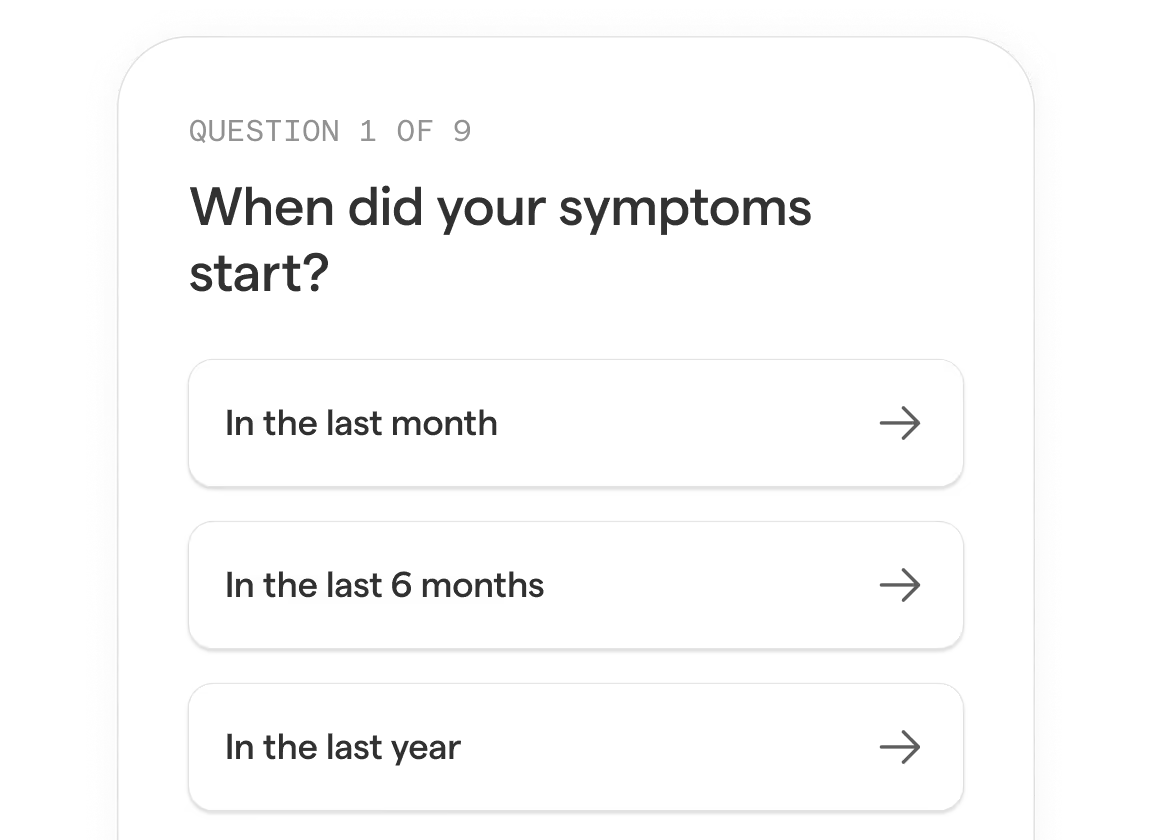Download the Felix App
Earn reward, visit our shop and get exclusive offers on the app
Download now

With Felix, you can get Dapagliflozin prescribed by a licensed healthcare practitioner and delivered to your door for free.
Dapagliflozin medications are a form of treatment for type 2 diabetes, which are used alongside diet and exercise to help control blood sugar levels and keep them stable.
Prescription Dapagliflozin may be suggested as a treatment alone (particularly if you can’t take Metformin), or as part of combination treatments alongside:
In some cases, you may see Dapagliflozin under the brand name Forxiga. It’s important to remember that Forxiga is just a brand name, and Dapagliflozin contains exactly the same ingredients.
If you’d like to learn more about Dapagliflozin medications, click here to explore more information.
Dapagliflozin medications work by encouraging your body to get rid of excess glucose, in order to help control blood sugar levels and keep them stable.
When you take doses of Dapagliflozin, glucose is expelled from your body through your urine. In turn, your body is able to better regulate your blood sugar levels without the excess glucose.
Dapagliflozin prescriptions are assigned to patients that have type 2 diabetes, and who are unable to control their blood sugar levels through diet and exercise alone.
When you’re prescribed Dapagliflozin, it may either be prescribed alone, or as part of a combination treatment plan (i.e., with Metformin, a sulfonylurea, etc.).
SIDE NOTE: It’s important to remember that Dapagliflozin medications are not meant to be used for treating patients with type 1 diabetes. If you have type 1 diabetes, it’s recommended that you don’t take doses of Dapagliflozin.
It’s important to note that not everyone who takes Dapagliflozin will have side effects. However, some of the most commonly occurring side effects of Dapagliflozin include:
In addition to these side effects of Dapaglifozin, there are some other more serious side effects to be mindful of occurring. You should let your practitioner know immediately if you start to experience:
These aren’t all of the potential side effects of Dapagliflozin that you may experience, but other side effects are much more rarely occurring.
If you do start to experience any serious side effects of Dapagliflozin, you should contact your practitioner right away. They may be able to suggest an alternative dosage of Dapagliflozin or different medication that may work better for you.
There are some people who shouldn’t take Dapagliflozin, because interactions with their existing conditions or medications may cause additional negative side effects. These people include:
In addition to these concerns, there are some people who should be extra cautious when taking doses of Dapagliflozin, as it may interact negatively. You should talk to your practitioner before taking Dapagliflozin prescriptions if you:
Taking Dapagliflozin for your diabetes (type 2 specifically) helps control your blood sugar and keep them at safe, manageable levels, when it’s used alongside a healthy diet and exercise regimen.
Dapagliflozin does this by helping your body excrete unneeded/excess glucose harmlessly through your urine.
Dapagliflozin medications are known to lower your blood sugar, so you should avoid any activities that are going to actively decrease your blood sugar levels, or cause them to spike, thereby canceling out the sugars being expelled through your Dapagliflozin prescription.
Since Dapagliflozin is known to expel excess sugars through urine, it’s a good idea to avoid drinking excessive amounts of diuretics like coffee, alcohol, etc., which can increase your chances of becoming dehydrated while using Dapagliflozin.
In addition, Dapagliflozin medications are known to increase your cholesterol levels, so it’s a good idea to ensure you’re eating a well-balanced diet that avoids high-cholesterol, trans fats, and fried foods that are likely to also increase blood cholesterol levels.
Lastly, because Dapagliflozin may cause dizziness or lightheadedness in some patients, it’s important to avoid using heavy machinery while taking doses of Dapagliflozin.
No, you shouldn’t take Dapagliflozin for diabetes while pregnant, planning to get pregnant, breastfeeding, or planning to breastfeed.
Prescriptions for Dapagliflozin may cause interactions with unborn fetuses/nursing children, so it’s recommended to avoid taking this medication if any of these scenarios apply to you.
Further reading








Before you can get a prescription for Dapagliflozin from Felix online in Canada, you’ll need to get assessed by a licensed healthcare practitioner.
All you need to do to get started is complete a short online assessment (at your convenience), and if your assigned practitioner thinks that a Dapagliflozin prescription is the right treatment option for you, alongside a healthy diet and regular exercise, they can provide you with one.
Plus, if you are approved for doses of Dapagliflozin with Felix, our pharmacy partners can fill and deliver your Dapagliflozin in Canada, at no additional cost to you! This includes arranging for automatic Dapagliflozin refills in the future, so you always have your diabetes medications ready when you need them.
There’s no way for Felix to answer this question for everyone, because each benefits package will include different types of coverage, and different providers will include some medications they cover and some they don’t.
Your best bet would be to reach out to your insurance representative directly, prior to making your request for Dapagliflozin online with Felix.
This way, you can provide all necessary insurance information to your practitioner during the assessment, and if they believe Dapagliflozin is right for you, they can bill your insurer directly to save you the time and trouble!
At this time, Dapagliflozin’s only brand name is Forxiga.
It’s important to remember that while the generic name for this medication is Dapagliflozin, the brand name alternative (Forxiga) contains the exact same ingredients.
You may be able to buy Dapagliflozin online in Canada, but first, you’ll need to get assessed by a licensed healthcare practitioner, like those you can find at Felix!
With Felix, we’re making this process as quick, seamless, and accessible for Canadians through our secure, chat-based online assessment system, where you can complete an assessment on your schedule - anytime, day or night.
One of our practitioners will usually get back to your request within 24 hours, and if they think a prescription for Dapagliflozin is right for you, based on your health and medical history, they can provide one for you.
Best of all, Felix can ship your Dapagliflozin in Canada, for no additional cost. You just have to pay a small assessment fee, as well as the cost of your prescribed medications (and any Dapagliflozin refills in the future). We’ll take care of the rest.
Felix is Canada’s first truly integrated healthcare platform. We provide on-demand treatment for everyday health needs like weight loss, mental health, sexual health, and more. Founded in 2019, our digital-first approach to healthcare includes everything from diagnosis to prescription — all accessible from the comfort of home.
No. Felix provides a faster, hassle-free way for you to get a treatment plan for certain conditions, but our service does not replace your primary care provider. For matters that extend beyond obtaining a lifestyle treatment safely and easily, we encourage you to consult your primary health practitioner in person — whether for checkups, personal health concerns, or to inform them about your current treatments or treatment plans.
Absolutely. Our online assessments have been designed to ask all the necessary questions required for diagnosis. We've worked with specialists to create an assessment process that can provide sufficient information for the healthcare practitioner to determine whether or not you are eligible for a prescription and craft an appropriate treatment plan.
Call 911 or proceed to your nearest emergency room immediately. Felix is not intended for medical emergencies. Once the emergency has been addressed or resolved, contact your prescribing practitioner to inform them of your experience as this may impact your current treatment plan.
Anyone who is 18 years or older (16 or older for acne and birth control prescriptions), and is located in Alberta, British Columbia, Manitoba, Newfoundland and Labrador, Nova Scotia, Prince Edward Island, Saskatchewan or Ontario. We cannot ship treatments outside of these provinces at this time.
After creating an account, you will complete a medical assessment for evaluation by one of the Felix healthcare practitioners.
During your assessment, you will have the opportunity to send your practitioner questions via secure messaging.
In most cases, practitioners will complete your assessment with secure messaging alone but sometimes they may determine you require an audio or video visit and/or further diagnostic testing to help determine the best treatment plan for you.
If your practitioner has determined a prescription treatment is appropriate, they will approve your visit and write you a prescription. Our pharmacy will then ship your prescription to your home.
You’ll be able to message your healthcare practitioner if you have questions or want to make changes to your treatment at any time.
No. We use an asynchronous telemedicine model so you can complete your online visit in your own time and we save your progress so you can come back later to finish it.
If you are completing a visit in the mental health or weight loss categories, your healthcare practitioner may require a phone or video call to discuss your medical profile further during the assessment process.
Most assessments do not require a phone or video conversation. Once a prescriber has reviewed the info in your assessment they will respond to you via secure instant messages that you can access within your Felix account.
If you are completing a visit in the mental health or weight loss categories, your healthcare practitioner may require a phone or video call to discuss your medical profile further during the assessment process.
You can expect to receive a response from a healthcare practitioner within 24 hours of submission. If you’ve been waiting longer than this, please reach out to our Patient Support team through the chat bubble in the bottom right corner of your account or our Contact Us page.
No. A visit with a licensed healthcare practitioner is required for all treatments currently provided through Felix’s service.
Not long. After completing your assessment, a practitioner will generally respond within 24 hours, and often much sooner.
Treatment plans will be processed within 2-4 business days of your approval date if there is nothing blocking fulfillment.
All packages usually takes 2-3 business days. You will receive an email with your tracking number once your treatment has been shipped.
Absolutely. All Felix shipments arrive in a nondescript blister package so you can have your treatment shipped wherever makes sense for you as long as there is someone there to sign for it.
A signature upon delivery may be required.
There is currently no cost to have your treatment shipped to you from our Felix Pharmacy network.
Yes, your security is paramount to Felix’s mission. Personal health information provided during your medical assessment is strictly and legally confidential between you and the Felix healthcare practitioner.
Beyond that, all your account information (including the medical assessment, credit card, and shipping information, etc.) is also stored safely and securely. Felix is compliant with all federal and provincial health privacy legislation. It is our duty to protect your data with comprehensive security infrastructure and stringent data policies to ensure it stays private and secure.
Read more on our Privacy Policy.
Yes! In Canada, only a licensed healthcare practitioner can write a prescription, and only a registered pharmacist can fill that prescription. We are supported by leaders in the Canadian pharmacology and specialized medical fields. Felix adheres strictly to all the regulations set forth by all applicable Colleges of Pharmacists and Colleges of Physicians and Surgeons in which we operate.
Absolutely. All prescriptions obtained via Felix are provided by licensed Canadian healthcare practitioners—the same as you would get at a hospital, doctor’s office, or clinic. These practitioners do not provide prescriptions unless they deem it medically safe and appropriate to write them based on your medical profile and assessment answers. Our assessments have been crafted by the practitioners on our medical team. Finally, all Felix Pharmacies are provincially accredited just like any retail pharmacy.
Your privacy is our top priority. All your data is 256 bit SSL/TLS encrypted, and we take significant steps to keep your data secure. You can read our Privacy Policy for more information.
Felix charges a fee for the online visit. In most cases the fee is $40 but varies by treatment category. The visit fee includes a prescription valid for up to a year (depending on the condition) and on-going support from the healthcare practitioner or pharmacist.
It depends. Treatment costs vary but will be in line with what you would pay at a pharmacy in person. You will see the estimated cost of your treatment before insurance, during the online visit but will only be billed for medication costs for your prescription once it is approved and sent to our pharmacy. Once approved, your treatment and payment will be processed within one to two days.
Keep in mind that you won’t necessarily need to pay the full price yourself. If you have insurance, Felix’s partner pharmacies will bill your insurer directly. You may also be eligible for financial support in your province.
We accept all major credit cards for any aspect of your treatment not covered by insurance or other financial support
Treatment coverage varies greatly between different insurance plans.
The good news is that if you are covered, Felix can bill your insurer directly, and then process your treatment plan at no additional cost to you. We recommend that you upload your private and/or provincial benefit card during the online visit so that our pharmacy partner can apply any coverage you are eligible for before processing your treatment plan.
Insurance coverage for treatment plans through Felix doesn't include the cost of your visit.
A Felix online visit is considered asynchronous since it is conveniently completed through a secure chat bases system. Currently, asynchronous visits are not covered by insurance or provincial health plans so you will be charged a visit fee, depending on the category of treatment you are requesting.
Medication coverage varies greatly between different plans, provinces, and has specific criteria that determine eligibility. For private insurance, we recommend contacting your benefits administrator with your details and the Drug Identification Number (DIN) and the drug name to determine your coverage.
For more details on provincial health plan coverage see below:
Alberta: Learn more about AHCIP here. Search for covered drugs here.
British Columbia: Learn more about MSP here. Search for covered drugs here.
Manitoba: Learn more about MHSIP here. Search for covered drugs here.
Newfoundland and Labrador: Learn more about MCP here. Search for covered drugs here.
Nova Scotia: Learn more about MSI here. Search for covered drugs here.
Ontario: Learn more about OHIP+ here. Search for covered drugs here.
Prince Edward Island: Learn more about Health PEI here. Search for covered drugs here.
Saskatchewan: Learn more about Saskatchewan Health Coverage here. Search for covered drugs here.












